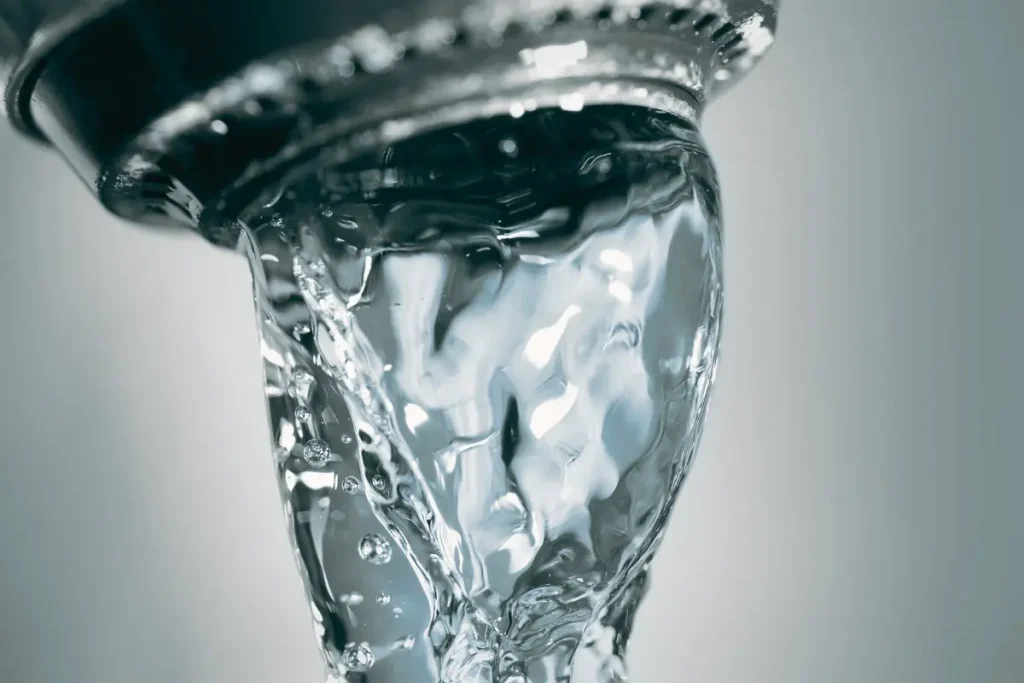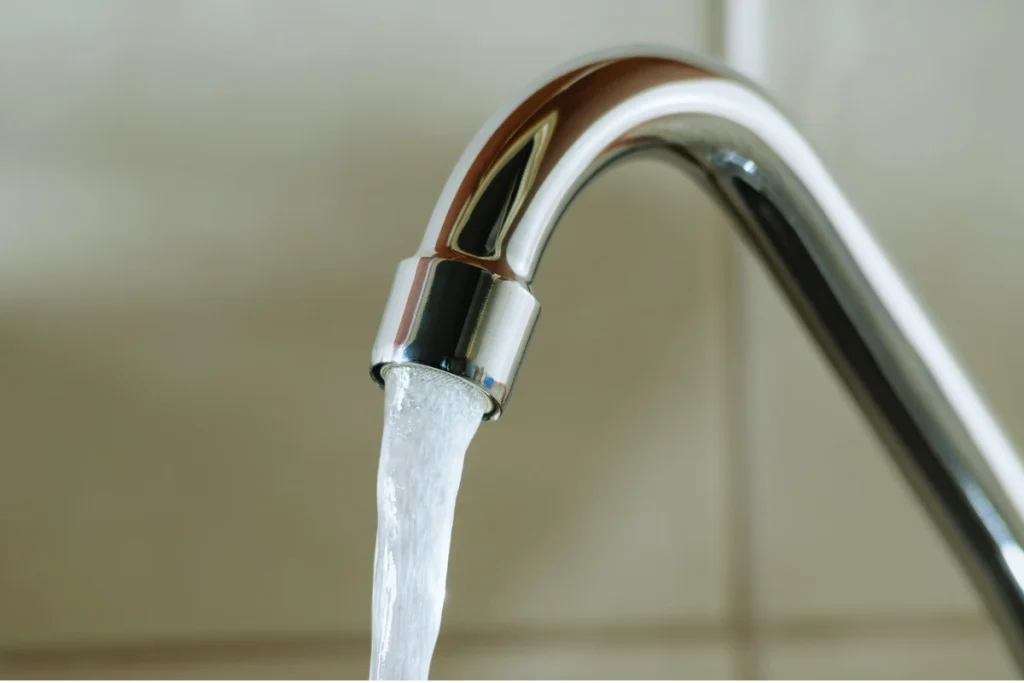Kitchen tap water is usually freshwater. It is treated and safe to drink.
Water quality varies by region. Most homes get water from a municipal supply. This water is treated to remove impurities. Yet, some people still wonder about the type of water in their kitchen tap. Freshwater or saltwater? Understanding this can help you learn more about water sources and their safety.
In this post, we will explore the nature of kitchen tap water. We will discuss how it is processed and why it’s safe for daily use. Stay with us as we uncover the facts about your kitchen tap water.

Kitchen Tap Water Sources
Understanding where your kitchen tap water comes from is crucial. It ensures you know about its quality and safety. Kitchen tap water sources vary, mainly falling into two categories: Municipal Water Supply and Well Water Systems.
Municipal Water Supply
Most urban areas rely on a municipal water supply. This water comes from large reservoirs, rivers, or lakes. It goes through a treatment process before reaching your tap. This process usually includes:
- Filtration
- Chlorination
- Fluoridation
The water is treated to remove impurities. It is also tested regularly to meet safety standards. This helps ensure that the water you drink is clean and safe.
Well Water Systems
Rural areas often use well water systems. This water comes from underground sources. Homeowners drill wells to access these water sources. The water is naturally filtered through soil and rock layers. This can make it cleaner than surface water.
However, well water is not treated by municipalities. Homeowners must test and treat it themselves. Common treatments include:
- Filtration
- Softening
- Disinfection
Testing is crucial for well water. It checks for contaminants like bacteria and chemicals. Regular maintenance ensures the water remains safe for household use.
Understanding Freshwater
Understanding freshwater is key to knowing the water quality in your kitchen tap. Freshwater is essential for drinking, cooking, and cleaning. Most people use freshwater daily without thinking about its sources and characteristics. Let’s dive into what freshwater is and where it comes from.

Definition Of Freshwater
Freshwater contains low levels of dissolved salts and other solids. Typically, it has less than 1% salt concentration. Freshwater is safe for human consumption and household use. This water is free from harmful chemicals and pollutants. It supports a wide range of life forms and ecosystems.
Sources Of Freshwater
Freshwater comes from various natural sources. Rivers, lakes, and streams are familiar sources. These bodies of water collect rainwater and melted snow. Groundwater is another important source. It lies beneath the Earth’s surface in aquifers. Humans access it through wells and springs.
Glaciers and ice caps hold a significant amount of Earth’s freshwater. They release water slowly as they melt. This process feeds into rivers and lakes. Desalination plants also provide freshwater. They remove salt from seawater, making it safe to use. These plants are vital in areas with limited natural freshwater sources.
What Is Saltwater?
Saltwater, as the name suggests, contains significant amounts of dissolved salts. It is not suitable for drinking or cooking due to its high salinity. Understanding the nature of saltwater is vital to differentiate it from freshwater.
Characteristics Of Saltwater
Saltwater has unique properties that set it apart from freshwater. These characteristics include:
- High Salinity: Saltwater contains a high concentration of salt, mainly sodium chloride.
- Density: It is denser than freshwater because of the dissolved salts.
- Freezing Point: Saltwater has a lower freezing point compared to freshwater.
- Electrical Conductivity: Saltwater conducts electricity better due to its mineral content.
Sources Of Saltwater
Saltwater is abundant on Earth and comes from various sources. The primary sources include:
- Oceans and Seas: The most significant bodies of saltwater, covering about 71% of Earth’s surface.
- Salt Lakes: Smaller, landlocked bodies of water with high salt concentrations, like the Dead Sea.
- Brackish Water: A mix of freshwater and saltwater, often found in estuaries.
Understanding these sources helps in recognizing where saltwater is naturally present. It is essential to know that saltwater is not suitable for household use. Kitchens use freshwater, which is safe for drinking and cooking.
Water Treatment Processes
Clean water is essential for every household. Ensuring that the water from your kitchen tap is fresh and safe involves several water treatment processes. These processes help remove impurities and make the water fit for consumption. Let’s explore some of these methods.
Filtration Methods
Filtration is a common way to purify water. It involves passing water through filters to remove contaminants. These filters can be made of sand, charcoal, or other materials. They trap dirt, bacteria, and other particles. Some filters even remove chemicals and heavy metals. This process ensures the water is clean and safe.
Desalination Techniques
Desalination is used to make saltwater drinkable. It removes salt and minerals from seawater. One common method is reverse osmosis. This process pushes water through a special membrane. The membrane blocks salt and other impurities. Another method is distillation. This heats seawater to create steam. The steam is then cooled to form freshwater. Both methods produce safe, clean water for your home.
Tap Water Composition
Understanding the composition of your kitchen tap water is essential. Is it freshwater or saltwater? Tap water usually comes from freshwater sources. But it’s not just plain water. It contains various elements and contaminants. This section will explore the common pollutants and trace elements found in tap water.
Common Contaminants
Tap water can have various contaminants. These can affect taste and safety. Common contaminants include chlorine, lead, and bacteria. Chlorine is often added to kill germs. Lead can enter water through old pipes. Bacteria might come from different sources. These contaminants can be harmful. Regular testing helps ensure water safety.
Trace Elements
Trace elements in tap water are usually harmless. They exist in tiny amounts. Common trace elements include calcium, magnesium, and iron. Calcium and magnesium make water “hard.” Iron can cause a metallic taste. These elements are not dangerous. They can even be beneficial. The right balance is key for health and taste.
Testing Your Tap Water
Ever wondered if your kitchen tap water is freshwater or saltwater? Knowing the type of water you consume is essential. It impacts your health and your home’s plumbing. Testing your tap water is the first step in identifying its quality. This section will guide you through different ways to test your tap water.
Home Testing Kits
Home testing kits are a convenient option. They are easy to use and affordable. You can find these kits at most hardware stores. Follow the instructions provided with the kit. Usually, you collect a water sample and add a testing solution. The solution changes color, indicating the water quality. Most kits can test for various contaminants, including salt.
Professional Water Analysis
For more accurate results, consider a professional water analysis. Professionals use advanced tools and techniques. They can detect even small amounts of salt in your water. Contact a local water testing service. They will collect a sample from your tap. The sample is then analyzed in a lab. You will receive a detailed report of the findings. This method ensures thorough and reliable results.
Health Implications
Understanding whether your kitchen tap provides freshwater or saltwater is crucial. The type of water can significantly impact your health. Here, we explore the health implications of freshwater and the risks of contaminated water.
Benefits Of Freshwater
Freshwater is essential for maintaining good health. Drinking clean, freshwater helps in:
- Hydration: Keeps your body hydrated.
- Nutrient Absorption: Aids in absorbing nutrients from food.
- Detoxification: Helps flush out toxins from the body.
- Skin Health: Keeps your skin clear and moisturized.
Freshwater from your kitchen tap can provide these benefits, assuming it is free from contaminants.
Risks Of Contaminated Water
Contaminated water poses serious health risks. Some potential dangers include:
- Waterborne Diseases: Bacteria and viruses can cause illnesses like cholera.
- Heavy Metals: Lead and mercury can lead to poisoning.
- Parasites: Can result in gastrointestinal issues.
- Chemical Contaminants: Pesticides and industrial waste can be harmful.
It’s essential to ensure that your kitchen tap water is safe to drink. Regular testing and using water filters can help mitigate these risks.
Ensuring Safe Tap Water
Ensuring that your kitchen tap water is safe is crucial. Most households depend on tap water for drinking, cooking, and cleaning. Maintaining this water’s quality is essential to avoid health issues. Let’s explore the steps you can take to ensure your tap water is safe.
Regular Maintenance
Regular maintenance of your plumbing system helps in keeping your tap water safe. Here are some steps to follow:
- Inspect pipes for leaks and damage.
- Check for rust or sediment buildup.
- Clean faucet aerators to remove debris.
- Monitor water pressure regularly.
Regular inspections can prevent contaminants from entering your water supply. It also helps identify and fix problems early.
Water Filters
Water filters are another effective way to ensure the safety of your tap water. Different types of filters can remove various contaminants. Here are some common types:
| Filter Type | Contaminants Removed |
|---|---|
| Carbon Filters | Chlorine, sediment, volatile organic compounds (VOCs) |
| Reverse Osmosis | Lead, mercury, arsenic, nitrates |
| UV Filters | Bacteria, viruses, microorganisms |
Installing the right filter can significantly improve your tap water quality. Ensure to replace filters as per the manufacturer’s instructions to maintain their effectiveness.
Frequently Asked Questions
Is Kitchen Tap Water Freshwater?
Yes, kitchen tap water is typically freshwater. It comes from local water treatment plants. These facilities process and purify water from natural sources like rivers and lakes. They ensure it’s safe for household use.
Why Is Tap Water Not Salty?
Tap water is not salty because it’s treated. Water treatment plants remove impurities, including salts. This process ensures the water is safe and fresh. Saltwater is not suitable for drinking or cooking.
Can Tap Water Be Saltwater?
In most places, tap water is not saltwater. Saltwater is not used for domestic purposes. Tap water is sourced from freshwater bodies. It undergoes treatment to remove contaminants.
Is It Safe To Drink Kitchen Tap Water?
Yes, kitchen tap water is generally safe to drink. It meets strict safety standards. Treatment plants test and purify it. However, in some areas, you might need a filter.
Conclusion
Kitchen taps provide freshwater, not saltwater. This water is safe for drinking. Understanding this helps maintain health. Always ensure your tap water is clean. Regularly check for any issues. Clean taps prevent contamination. Freshwater taps are standard in households. They support daily needs effectively.


